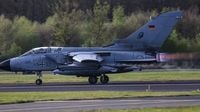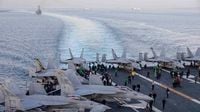The German Tornado aircraft are set to participate in aerial warfare training in the Middle East, marking the first involvement of the German armed forces in 13 years. This renewed engagement comes as Germany seeks to strengthen its military ties with countries in the Gulf region. The Tornado jets took off from the Norvenich Air Base in North Rhine-Westphalia to partake in the "Desert Flag 2025" maneuvers in the United Arab Emirates.
According to a spokesperson for the German army, the initial deployment consists of three Tornado aircraft, with training exercises scheduled to begin in April 2025. These maneuvers are not just a show of force; they are designed to enhance the German air force's capability in complex aerial warfare scenarios, including low-altitude operations and coordination with Joint Terminal Attack Controllers (JTAC), who direct fighter jets from the ground.
The United Arab Emirates has been described as a key and trusted partner for Germany in the region for many years. This collaboration is expected to provide significant benefits for both sides, enhancing operational readiness and fostering deeper military cooperation. Furthermore, this partnership is particularly important as Germany plans to expand its military presence in the Pacific region in the future.
The new German government, which has recently taken office, faces substantial challenges in terms of foreign policy. Many analysts view this moment in German history as the beginning of a new era, where the country must reassess its global positioning and responsibilities. The focus of German foreign policy is increasingly shifting towards the Middle East, especially in light of the recent upheaval in Syria.
In December 2025, the fall of the Syrian regime, which had been supported by Russia and Iran, significantly complicated the geopolitical landscape. While many Syrians celebrate the end of this regime, Germany remains cautious, watching closely to see if Islamist factions will impose strict governance, potentially leading to new waves of refugees heading towards Europe.
But the situation in Syria is just one of many complex issues facing the region. Historically, West Germany has maintained a commitment to democracy and the rule of law since World War II, positioning itself as a proponent of multilateralism. Foreign policy decisions have traditionally been made in close cooperation with friendly Western allies, particularly the United States, which has been responsible for the security of Germany.
At the Munich Security Conference in February 2025, U.S. Vice President Jay D. Vance emphasized that Europe must take on greater responsibility for its own defense. This statement has raised concerns among German leaders, including Friedrich Merz, the head of the Christian Democratic Union (CDU), who remarked, "We are at a historical crossroads; the security guarantees from the United States have become a matter of question, and the Americans are skeptical of democratic institutions."
In response to these shifting dynamics, German Foreign Minister Annalena Baerbock has consistently advocated for a united Europe as the solution to the changing global landscape. This includes forging new partnerships not only with Gulf countries but also with nations in South America, such as Argentina, Brazil, Paraguay, and Uruguay. In December 2024, Germany signed cooperation agreements with the European Union that aim to bolster these relationships.
As the German armed forces prepare for their upcoming maneuvers in the UAE, the implications of this renewed military engagement extend beyond mere training exercises. It signals a strategic pivot towards a more active role in international security affairs, particularly in regions that have historically been fraught with conflict.
Germany's commitment to enhancing its military capabilities and fostering alliances in the Middle East is indicative of a broader trend in European defense policy. With the specter of shifting U.S. foreign policy and the rise of new global challenges, Germany's actions may set the stage for a more assertive European defense posture in the years to come.
In conclusion, as Germany embarks on this new chapter of military cooperation with the United Arab Emirates and other Gulf nations, the outcomes of these initiatives will be closely monitored. The success of this strategy will depend not only on effective military collaboration but also on navigating the complex political landscape of the Middle East, where alliances are often tested and the stakes are high.





